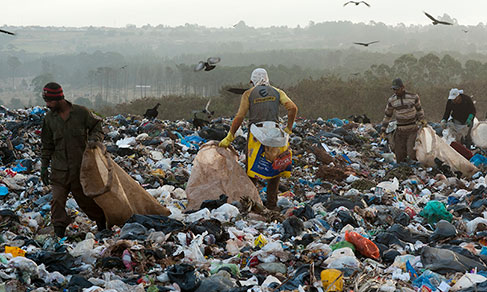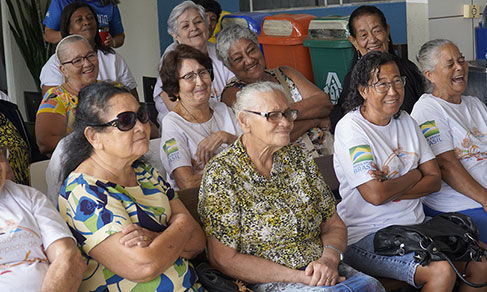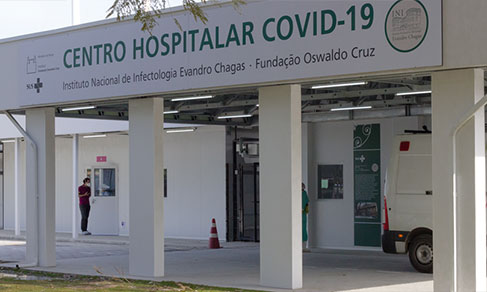Nossos serviços estão apresentando instabilidade no momento. Algumas informações podem não estar disponíveis.
MUNIC - Survey of Basic Municipal Information
About - 2024
The Municipal Basic Information Survey – Munic raises information on the structure, dynamics and operation of the municipal public institutions, especially the municipal administration, as well as on a number of policies and sectors involved in this sphere.
With the release of this publication, the IBGE presents the results of Munic 2024, whose investigation included issues related to human resources; IT and communication; governance; housing; transportation and urban mobility; agriculture; migration management instruments; and, for the first time ever, racial equality, a theme resulting from an institutional agreement signed with the Ministry of Racial Equality. This insertion aimed to understand the public structure available in municipalities for the management of specific policies on this matter, including investigating the existence of channels for receiving, registering and monitoring reports of violations of ethnic-racial rights. The results obtained in the survey are aggregated by population size classes, Major Regions and Federation Units, while the analyses, extensively illustrated, highlight the most relevant aspects of each of the topics examined and draw comparisons with statistics obtained in previous surveys.
Due to the historical magnitude of the climatic event that occurred in Rio Grande do Sul in April 2024, this edition of Munic also surveyed, on an exceptional basis, issues about the measures and actions undertaken during this episode, as well as about the dimensioning and management of its impacts, given that the consequences of such disasters not only compromise the urban and rural infrastructure of the affected municipalities, but also affect their economy, with direct repercussions on the health and well-being of local populations.
The volume includes technical notes with methodological considerations about the survey, as well as a glossary with the concepts considered essential for understanding its results.
In addition to this publication, the complete Munic 2024 database and the results tables corresponding to the survey´s Basic Questionnaire are also available on the IBGE portal.
These statistics make it possible to identify existing needs in Brazilian Municipalities, thus contributing to the democratization of public management through the formulation and improvement of differentiated policies for specific issues affecting their populations.
Tables - 2024
Information Technology and Communication (xlsx | ods)
IMigration Management Instruments (xlsx | ods)
Table index (pdf)
Concepts and methods - 2024
As informações a seguir descrevem os metadados estatísticos, que são o conjunto de conceitos, métodos e aspectos relacionados às estatísticas, e são informações necessárias para compreender as características e a qualidade das estatísticas e interpretá-las corretamente.
Informações Gerais
Objetivo
A pesquisa de Informações Básicas Municipais - MUNIC tem por objetivo suprir as demandas por informações desagregadas, em nível municipal, sobre a administração pública local, que possam contribuir para o planejamento e aprimoramento da gestão dos municípios. As informações coletadas pela pesquisa têm se mostrado de extrema utilidade para os gestores e estudiosos do poder local. Possuir dados estatísticos sobre a oferta, a diversidade e a qualidade dos serviços públicos são essenciais para aprimorar a capacidade dos governos municipais em atender a população. O conhecimento e a aprendizagem sobre a escala local, proporcionados pelas informações estatísticas, vêm responder às exigências imediatas de compreensão da heterogeneidade estrutural do País a fim de tornar efetiva a imensa riqueza, complexidade e criatividade brasileira no avanço social, político e econômico.Tipo de operação estatística
Pesquisa de gestão públicaTipo de dados
Dados de CensoPeriodicidade de divulgação
AnualPopulação-alvo
A população alvo da pesquisa é constituída pelo conjunto de prefeituras municipais brasileiras.Metodologia
A coleta dos dados é realizada após treinamento centralizado, onde se fazem presentes supervisores regionais e técnicos de todas as Superintendências. Posteriormente, estes são responsáveis pelo treinamento dos técnicos das mais de 500 agências do IBGE no País.
Para possibilitar o preenchimento dos questionários pelos diversos setores das prefeituras, cada instrumento de coleta contém, dispostas junto aos quesitos relativos, as explicações dos termos e conceitos utilizados.
Um importante aspecto a ser destacado quanto à metodologia interna do questionário refere-se ao formato de determinação do informante na prefeitura. Com o firme propósito de qualificá-lo, pessoal e profissionalmente, bem como ampliar seu comprometimento com a qualidade das respostas fornecidas, procede-se à sua identificação em cada um dos blocos temáticos específicos.
A entrada de dados é feita de forma descentralizada pela supervisão da pesquisa na sede de cada unidade regional ou pelo técnico responsável pela coleta nas próprias agências. A crítica de consistência dos dados coletados é feita em cada superintendência. O trabalho de apuração e consolidação das informações é de responsabilidade da Coordenação de População e Indicadores Sociais, elaborado por técnicos da Pesquisa de Informações Básicas Municipais.
Técnica de coleta:
PAPI - Entrevista pessoal com questionário em papel, CASI - Questionário eletrônico autopreenchidoTemas
Temas e subtemas
Rendimento, despesa e consumo, Estatísticas multidomínio, Gênero, Administração pública e participação político-social, Educação, Meio Ambiente, Estrutura e gestão da administração pública, Habitação, Cultura, recreação e esporte, Saúde, Proteção social, Justiça e segurança, Uso do TempoPrincipais variáveis
- Informações cadastrais do governo municipal- Pessoal ocupado na administração direta e indireta por vínculo empregatício
- Informações sobre comunicação e informática
- Informações sobre governança
- Informações sobre habitação
- Informações sobre transporte
- Informações sobre agropecuária
- Informações sobre instrumentos de gestão migratória
- Informações sobre igualdade racial
Palavras-chave
- Pessoal ocupado na administração direta e indireta por vínculo empregatício - Terceirização e informatização - Gestão ambiental - Agropecuária - Governança - Migração - Igualdade racial - Habitação - TransporteUnidades de informação
Unidade de investigação
MunicípioUnidade de análise
MunicípioUnidade informante
Município.Períodos de referência
Data de início da coleta
19/08/2024Data do fim da coleta
28/02/2025Disseminação
Formas de disseminação
Banco de Dados Agregados - SIDRA, Publicação Digital (online), Microdados no Portal do IBGENível de desagregação geográfica
MunicípioInstrumentos de coleta
Saiba mais
https://metadados.ibge.gov.br/consulta/estatisticos/operacoes-estatisticas/PMPublications - 2024
Perfil dos Municípios Brasileiros : 2024 / IBGE, Coordenação de População e Indicadores Sociais
Material type: Book
Year: 2025
Description
The Municipal Basic Information Survey - MUNIC presents, at regular intervals, detailed information on the structure, dynamics and operations of public municipal institutions through their different sectors, having the municipality as the investigation unit and the city hall as the major informant.
MUNIC began in 1999, involving all the municipalities in Brazil. The themes and issues of the basic questionnaire are regularly raised and aim at addressing the information needs of the society and of the Brazilian State. They will consolidate an up-to-date statistical and register database that provides a relevant set of indicators to assess and follow up the institutional and administrative boards of the municipalities. In a permanent effort to update the survey, MUNIC usually brings a supplement that includes specific subjects in a more detailed way. As of 2005, the block on the basic characteristics of the managers of the basic questionnaire began to be investigated at each 4-year period, always in the initial years of the administrations elected in the previous year.
The survey provides assorted information on the public municipal management, including the legislation and existing planning instruments in this administration sphere, especially those established in the Statute of the Cities and that, together with the master plan, aim at regulating the use and occupation of the urban soil; organization of the city halls; staff by employment relationship, both in the direct and indirect administration; financial resources used by management; and public sectoral policies in the areas surveyed (housing, transportation, agriculture, environment, etc.), among other aspects.
The periodicity of the survey is annual. The geographic coverage is national, with results released for Brazil, Major Regions and Municipalities. It should be highlighted that two Brazilian districts are treated by MUNIC as municipalities: the Federal District, headquarter of the federal administration, being Brasília the federal capital; and the State District of Fernando de Noronha, an archipelago located in the State of Pernambuco. In both cases, informants of the local administration answer the basic questionnaire.
Downloads
Technical Information
Methodological considerations on the Survey of Basic Municipal Information can be obtained in the Technical notes chapter of the results publications.
News and Releases
Supplements
Nearly half of municipalities did not have any food and nutritional security management body in 2024
Of the 5,544 Brazilian municipalities that responded to the Food and Nutritional Security Supplement...
07/11/2025
Supplements
Most states and municipalities distribute food baskets and meals
Em 2024, 24 Federation Units (FU) reported having carried out, in 2023, some type of action aimed at...
07/11/2025
Editions
MUNIC 2024: climate event affected more than 90% of the municipalities in Rio Grande do Sul
Released today (31) by the IBGE, data from the 2024 Survey of Basic Municipal Information (MUNIC) show...
31/10/2025
Supplements
MUNIC 2023: 31.9% of Brazilian municipalities still dispose of solid waste in landfills
Fourteen years after the enactment of the National Solid Waste Policy (Law 12,305, of 02/08/2010), which...
28/11/2024
Editions
Three out of four municipalities didn´t have any plan for early childhood in 2023
In 2023, 26.6% of the municipalities had a Municipal Plan for Early Childhood; proportion was 97.8% in...
31/10/2024
Editions
From 2019 to 2023, number of municipalities with an organizational structure for Human Rights decreases
In four years, there was a drop of 0.5 percentage points (p.p) in the number of municipalities in the...
31/10/2024
Editions
In 2021, just 19 municipalities reported not having confirmed cases of Covid-19
99.6% of Brazilian municipalities reported clinically or laboratory confirmed cases of COVID-19 in 2021,...
08/12/2022
Editions
Funding from Aldir Blanc Law was distributed among 61.1% of the municipalities in 2021
The results of 2021 Munic show that 61.1% of municipalities carried out the distribution of resources...
08/12/2022
Editions
Munic 2020: only 1.4% of municipalities did not adopt social isolation measures
In 2020, 98.6% (or 5,393) of municipalities that answered to the Survey of Basic Municipal Information...
10/11/2021
Editions
Almost all Brazilian city halls adopted social isolation measures in 2020
Social isolation measures against Covid-19 were adopted by 98.6% of a set of 5,467 Brazilian municipalities,...
10/11/2021
Errata
Calendar error in release Survey of Basic Municipal Information (MUNIC) 2024
Published date: 07/11/2025
Description:
The database of the Survey of Basic Municipal Information (MUNIC) 2024 was unduly released on the IBGE portal without the information of the Block of Climate Event in Rio Grande do Sul.Actions: The block of Climate Event in Rio Grande do Sul has been included.
Replacement of MUNIC 2021 database
Published date: 25/04/2024
Description:
The column of the variable MCUL42 in the spreadsheet corresponding to the theme Culture in the MUNIC 2021 database has been amended.Actions: Every empty cell of the variable MCUL42 has been filled with "Não".
Calendar error in the release fo the Survey of Basic Municipal Information: 2020 Profile of the Brazilian Municipalities
Published date: 19/03/2021
Desciption:
The IBGE identified a non-compliance with the survey release date,as in the calendar made available in December 2020. Due to the need to revise deadlines, the disclosure of the Survey of Basic Municipal Information: 2020 Profile of Brazilian Municipalities was changed from October to November 2021.Actions: The release calendar has been amended.
Replacement in the 2018 MUNIC database
Published date: 03/11/2020
Description:
Inversion of the position of 3 columns in the database in the topic of culture led to the incorrect coding of 3 variables.Actions: Culture database amended.
Incorrect release date for the Survey of Basic Municipal Information
Published date: 09/05/2019
Description:
An error, found by the IBGE, due to the non-compliance to the survey release date as previously informed, in December 2018. Due to the need of rescheduling, the new relese date for the Survey of Basic Municipal Information Survey is September 25.Actions: The release calendar was corrected.
Typing error in the Survey of Basic Municipal Information - MUNIC 2017
Published date: 04/10/2018
Description:
Typing error identified by the IBGE, in the files of results table 1 and 2, for Major Regions and Federation UNits and on the database: the information about sex for a municipal administrator had been mistyped.
Actions: Files replaced.Calendar error in the release of the Supplement Municipal Management of Basic Sanitation - Water Supply and Sewage from the Survey of Basic Municipal Information
Published date: 06/06/2018
Description:
Error, identified by the IBGE, for the non release of the survey on the date set in the calendar made available in December 2017. Due to the necessary date revision, the release of results on Municipal Management of Basic Sanitation - Water Supply and Sewage from the Survey of Basic Municipal Information was rescheduled for September 19.
Actions: Calendar amended.
Replacement of the Publication Profile of Brazilian States and Municipalities 2014
Published date: 01/09/2015
Description: Inconsistencies were reported between the information in the analytical texts and in the estimates from the original tables and, as a result, incorrect figures were recalculated.
Actions: Errata included in printed publication. Update note included in the page giving access to the file.













